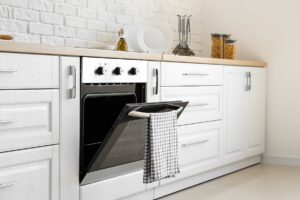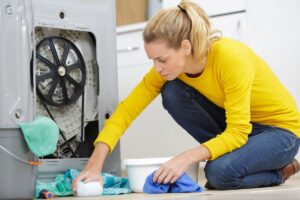Last summer kicked off with a sizzling start. An early heat wave hit the southern states in early June, and the reemergence of El Niño gifted some parts of the country with a sun-sational summer. Is your air conditioner up to the challenge that may be Summer 2024? Our experts put together these quick HVAC tips for summer to help you chill out and enjoy the season.
Overall, air conditioners and/or HVAC units are an easy appliance to maintain. Central air conditioners generally require:
- Regularly replacing or cleaning the air filters.
- Cleaning the evaporator
- Fixing bent coil fins.
- Scheduling an annual or biannual servicing.
Replace or clean your HVAC air filters
Air filters need to be cleaned or replaced as per manufacturer’s instructions. This task may need to be done as frequently as once a month or as rarely as once a year. (Many air filters need to be changed or cleaned once every three months.)
How to replace an air filter
While all HVAC units may have a slightly different process, here are the general steps to replacing an air filter:
- Remove the access panel.
- Take out the used filter.
- Insert the new filter. (The arrow on the filter generally should point in the direction of the air flow.)
- Close the access panel.
- Turn the unit back on.
Always check your manufacturer’s instructions before completing any maintenance.
How to clean an air filter
If your filter needs to be cleaned and not replaced, the following steps apply to your unit:
- Remove the access panel.
- Take out the filter.
- Use your shower or garden hose (outside) to clean the air filter.
- Spray the clean side of the filter, not the side with the accumulated dust or dirt.
- Reinstall the filter after it has completely dried.
- Close the access panel.
- Turn the unit back on.
These are generally the same steps for cleaning wall unit air-conditioning air filters, too, but remember – always check the manufacturer’s instructions before completing any maintenance.
How to clean your evaporator coils

Cleaning evaporator coils happens less frequently, generally once a year, though you can keep the coils clean longer by keeping the area around the unit (about two feet) clear of leaves, tall grass, branches, etc.
You can clean evaporate coils a few different ways. With compressed air, blow air in the opposite direction than normal air flow and not at an angle, which can bend the coils. Then, you can clean the debris with a shop vac.
Be careful, though. Fins can easily bend! After removing the debris, clean the fins with detergent or a garden hose. If at any time you’re not sure how to complete this, call a professional technician.
If you do happen to bend coils, the coils can restrict the unit’s flow of air. A “fin comb” can be used to easily move the coils back to their original position.
Don’t forget about an annual servicing
You should hire a licensed professional to perform AC maintenance, ideally twice a year – once before summer’s heat arrives and once before winter’s cold temperatures roll in. A licensed HVAC contractor will perform all the annual air conditioner maintenance that you shouldn’t tackle, such as:
- Inspecting all the unit’s moving parts.
- Checking refrigerant level and ensuring there aren’t leaks.
- Cleaning fans and coils.
- Clearing clogs in the condensate drain.
- Repairing or replacing the wiring, electrical connections, motors, and belts if necessary.
- Ensuring accuracy of the thermostat.
- Checking for seal duct leakage.
How much does AC maintenance cost? According to Forbes, an AC service can cost between $80-200, depending on the size of your unit and where you live. A large AC/HVAC system servicing can cost more than $450, not including any repair costs.
How to care for a room AC unit
Room air conditioning units require less maintenance. Clean the air filter(s) as per manufacturer instructions. These air filters generally need to be cleaned more frequently, such as once a month or once every few weeks.
Also, make sure to plug the unit directly into a GFCI outlet. Never use an extension cord. Small room air conditioners (drawing less than 7.5 amps of electricity) can be plugged into a usual 120-volt outlet, though it should be the only appliance or item plugged into that outlet. Larger air conditioners will require a 240-volt outlet, which requires professional installation.
Troubleshooting common issues with your HVAC/AC system
Is it not getting cool in your house? Or is your unit freezing up? Here’s what you can do.
Check your doors and windows
Different air-conditioners have different environmental requirements. If you have a central HVAC unit, make sure to have interior doors open, so air flows well from one room to the next. If you have a wall unit, then you should close interior doors to keep the immediate area cool. In both cases, close all the home’s windows and exterior doors, so the cold air doesn’t escape.
Also, check your ceiling fans to make sure they are spinning in the correct direction – counterclockwise. This will push the cool air down toward you.
These tips can also help you to save energy and save money!
Reset the circuit breaker
If your unit won’t turn on, check your circuit breakers. Your HVAC unit should have its own circuit breaker that may have been tripped or your wall unit may have tripped its outlet’s corresponding breaker. In both cases, give the unit five minutes to cool down before resetting the breaker.
A central air conditioner also has a high-pressure limit switch, which can trip. If this happens, the switch can be reset by pressing a button located in the compressor’s access panel. (Always check the manufacturer’s instructions and when in doubt, call a professional.)
What to do when your HVAC freezes up in summer

If you notice your unit’s condenser coils are covered in frost, you may have a refrigerant leak. This usually happens when the unit is also blowing warm air and there’s a faint hissing or gurgling noise. You may also see a spike in your energy bills as the unit has to work harder to keep your home cool.
Unfortunately, leaking freon, a frequent refrigerant, can also cause headaches, nausea, sore throat, difficulty breathing, vomiting, and more. If you suspect your unit is leaking refrigerant, call a professional to investigate. If you’re not feeling well, seek medical attention.
Your condenser runs all the time
That’s not a good thing. Your air conditioning system should only run two to four hours a day intermittently. It could be that your condenser is dirty and needs to be cleaned (see how above). However, it might also be:
- An issue with the fan.
- Your weatherstripping is old and lets the cool air escape.
- Your air filter needs to be changed or is the wrong size.
- Your programmable thermostat may not be working properly.
- Your refrigerant needs to be replaced.
It’s best to call a licensed technician to investigate the issue, so you can just relax and chill.
Stay on top of home maintenance
Homeownership can be hard, but it doesn’t have to be. The vipHome.app can help. In less than four minutes, enjoy a new way to manage your home. Simply download the app, register your home, and enjoy a simplified homeownership experience.






